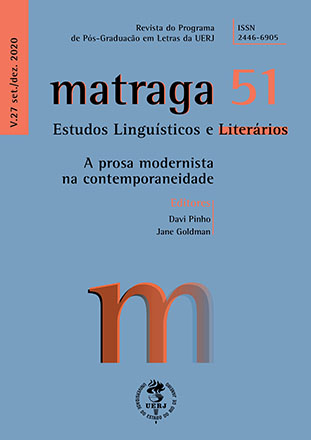“Indefinite, remote, but punctual as always”: a brief look at Joycean essayistics
DOI:
https://doi.org/10.12957/matraga.2020.49444Keywords:
Essayistics, James Joyce, De santos e sábios.Abstract
This article aims to succinctly present some of the main features of James Joyce’s essayistic production. Proverbially celebrated for his fictional output, Joyce presents in his essays a facet of his work that is less known, notably in Brazil. The launching of De santos e sábios (2012) in Brazil has considerably altered this scenario. It is a collection of 57 non-fictional texts written by Joyce and translated into Portuguese by a group of Brazilian Joycean scholars. Throughout this article, four essays are addressed so that two distinct and complementary goals are achieved. On the one hand, the article aims to demonstrate that, as Caetano Galindo argues, there indeed is an intrinsic relation among themes, notions, and ideas present in this non-fictional portion of Joyce’s production and the overall ‘project’ of Joyce’s work. In order to do so, existing connections among Joyce’s essays and his fictional and epistolary outputs are brought into light. On the other hand, these four essays are also addressed for the purpose of illustrating the three main aspects of Joycean essayistics listed by Kevin Barry: the politics of Joyce’s journalism; Joyce’s strategic theory of art; and Joyce’s analysis of Irish cultural history.Downloads
Downloads
Published
How to Cite
Issue
Section
License
Authorization
Matraga – Scientific Journal of the Post-graduate Program in Arts and Humanities of UERJ is authorized to publish the article submitted here, if it is accepted for online publication. It is attested that the contribution is original, that it is not being submitted to another publisher for publication, and that this statement is the expression of truth.
The works published in Matraga's virtual space – Scientific Journal of the Post-graduate Program in Arts and Humanities of UERJ will be automatically transferred, and your copyright is reserved to Matraga. Its reproduction, in whole or in part, is conditional on the citation of the authors and the data of the publication.

Matraga uses license Creative Commons - Attribution-Non-Commercial 4.0 International.





